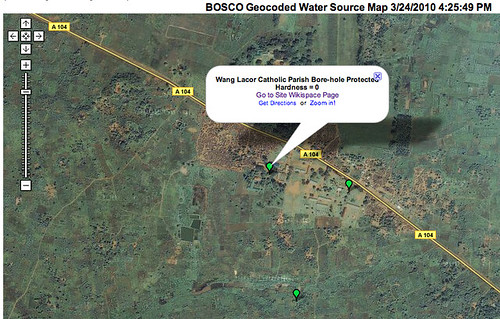This International Women's Day, it is a pleasure to greet the women volunteers of the BOSCO network. Inspired by you, may we work together with partners like FITE to bring about a more peaceful and joy-filled world.
Arch Bishop John Baptist Odama speech at the Breaking Borders Award
1 comments Posted by aliker david martin at 2:11 PM Jokondino Okema of Pagak, working with students from Lacor, has begun to implement the water source mapping project. Each of the points on the map contains the results of a proof-of-concept water quality test, and a hyperlink to images and additional information about the water source. Students and teachers use GPS units to obtain longitude and latitude information. The location and water quality data are entered into a Google form embedded in a wiki page, which is automatically mapped each evening through mapalist.com. This technology is teacher-friendly: the hope is that teachers will be able to create their own mapping projects using this same technology.
Jokondino Okema of Pagak, working with students from Lacor, has begun to implement the water source mapping project. Each of the points on the map contains the results of a proof-of-concept water quality test, and a hyperlink to images and additional information about the water source. Students and teachers use GPS units to obtain longitude and latitude information. The location and water quality data are entered into a Google form embedded in a wiki page, which is automatically mapped each evening through mapalist.com. This technology is teacher-friendly: the hope is that teachers will be able to create their own mapping projects using this same technology.
As partners of Voices of Africa, who recently won the World Bank Innovation Fair challenge, we will be heading to South Africa (albeit virtually) to mingle with other ICT/ICT4D experts!
Labels: ICT, ICT4D, World Bank
Over at Project Diaspora, TMS Ruge responds to challenges from OLPC. A lot of what he says in this post makes me think of BOSCO-Uganda (as it is now and also where we want to see it go). I think a central question to the OLPC debate, as well as to the rampant spread of telecenters, is: "How do we provide technology while also offering value-add training that teaches a responsible and engaging use of technology over and above the basics?" Read more here.

Labels: C2C, Classroom to Classroom, GPS, Gulu, Uganda
It looks like I have some very big shoes to fill. The Bye Bye Bailey post made me realize how much Kevin has contributed over the years and become a part of the family. I hope I can offer a smalll slice of what he has!
I will join the BOSCO team in mid-March. With skills primarily rooted in journalism and communications, I look forward to building BOSCO's reputation and scope, as well as helping partner centers spread the word about their work.
More information on myself can be found on my blog and website. Kevin has been beyond helpful in helping me prepare and I can't wait to hit the ground running!








